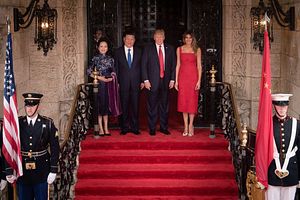U.S. President Donald Trump’s recent spate of aggressive moves against China are having an impact – politically at least. From slapping on tariffs on Chinese goods to America, to the fiercely categorical remarks about the threat China poses issued by Vice President Mike Pence in early October, the Trump administration has shocked Chinese leaders and their advisors into something that often looks like reactive panic.
Even the sinuous brilliance and calculating genius of Wang Qishan, brought back as vice president last October despite being over the customary retirement age, has seemingly, so far, not ratcheted tensions down. The world watches as the one bilateral relationship everyone thinks absolutely cannot fail seems to be doing precisely that. Unlike Nixon, who threatened to act like a mad man, but remained too lucid and clear to really pull it off, Trump seems to have convinced a broad and diverse group of interlocutors that he actually is authentically crazy.
One thing that has proved most illuminating about Trump’s brutally simple approach is the way in which it has, either by accident or design, read an aspect of Chinese psychology well. If there is one thing the last four decades has proved, it is that in their hearts, Chinese admire and look up to the United States – or at least, admire and look up to its power. For all the rhetoric of working on the basis of equality with smaller, nonaligned nations, and showing solidarity with the developing world, China’s actions prove it wants to be the equal of the United States, and copy the model of power of the U.S. – without all the expense.
To this end, China has put more effort and political capital into its relationship with America than any other power. On this matter, Chinese leaders have voted with their feet. President Xi Jinping and Premier Li Keqiang both sent their daughters to be educated in the United States. Twice since coming to power in 2012, Xi has broken with protocol in undertaking visits across the Pacific, once to Sunnylands in 2013, and then to Mar-a-Largo in 2017, to spend significant amounts of time with U.S. presidents. On both occasions, it was the Americans’ turn to visit China. In signs big and small, China manifests its desire to be like an Asian United States. China’s awe, and sometimes pure jealousy, of U.S. economic and military power, is often ill-disguised. It seems to be spread everywhere, from the massive effort that China has undertaken to steal U.S. technology, to the immense attention China has paid to studying and understanding the U.S political system.
That sort of context gives the impact of the Trump moment an extra dimension. Speaking to people in China nowadays about Trump, the extraordinary thing is that so often there is barely concealed admiration for what the 45th president is doing — even at the same time as people are decrying his actions. He is showing to Chinese, people seem to be saying, that the United States still really has power, and that it can still prosecute its ideas with consequences and clout.
The Europeans have always been easy game to Beijing – divided, and divisible. South Asia and the subcontinent are strategically important, but figure in the Belt and Road Initiative as a place to be locked closer to China with debt, infrastructure, and investment. Smaller countries can be isolated and bullied; larger ones incentivized by economic benefits. But the United States under Trump has shot out of this pragmatic huddle. And its assertion of raw power has caught many Chinese commentators, and members of the middle class, in a classic moment of complete ambiguity – seeing the United States affirm its capacity and prowess, even as it causes their country problems. It’s almost like an athlete finding their opponent — after years of looking soft and predictable — has suddenly really turned the game up on them. In their heart, the competitor quite admires and appreciates this.
This is not to defend the Trump onslaught. It as much a sign of panic as real potency and effective power. And while in the short term it may work a little in rebalancing things, in the long term it’s hard to see these kind of guerrilla tactics being sustainable and creating real solutions. But as of today, Trump — with his unerring genius for locating and exploiting the vulnerabilities of others — has illustrated that the spirit of Ah Q is alive and well in China.
Ah Q, for those who have forgotten, was a figure created by great writer Lu Xun in the 1920s to lambast the national character – sycophantic to those more powerful, and harsh and bullying to those who were weaker. The Chinese today have to do everything they can to kick this habit – and one such step would be to use the Trump fight to show they no longer have this complicated, half-envious, half-admiring attitude toward the United States. In that sense, Trump could really do China a favor.

































